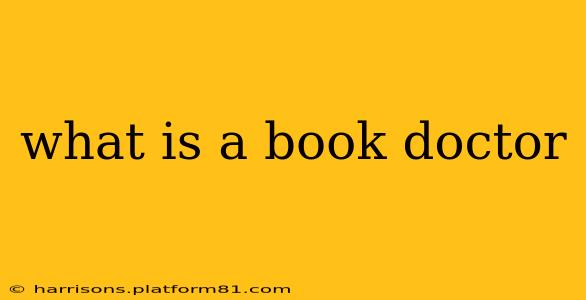A book doctor isn't a medical professional for your favorite novel; instead, they're a crucial part of the publishing process, acting as a consultant and editor to help authors refine their manuscripts. They offer a range of services, often focusing on the structural and narrative elements of a book, going beyond simple proofreading or copyediting. Think of them as a literary surgeon, carefully diagnosing and addressing the weaknesses in a manuscript to make it stronger, more marketable, and ultimately, a better read.
What does a book doctor do?
Book doctors provide a wide variety of services, tailored to the specific needs of the author and their manuscript. These services often include:
-
Developmental Editing: This is perhaps the core function of a book doctor. It involves a deep dive into the manuscript's structure, plot, pacing, character development, and overall narrative arc. They'll assess the strengths and weaknesses, providing feedback on how to improve the story's flow, create more compelling characters, and tighten the narrative.
-
Plot Analysis & Structure: Many authors struggle with plotting. A book doctor can analyze the plot, identify plot holes, and suggest solutions for creating a more engaging and logical storyline. They can help restructure the manuscript for better pacing and impact.
-
Character Development: Compelling characters are essential to a successful book. A book doctor can help you develop more realistic, well-rounded, and memorable characters. They can assess character arcs, motivations, and relationships, identifying areas for improvement.
-
Worldbuilding (for Genre Fiction): In genres like fantasy and science fiction, worldbuilding is crucial. A book doctor can help ensure that the world is consistent, believable, and engaging.
-
Critique & Feedback: Beyond specific suggestions, a book doctor offers constructive criticism, helping the author understand the overall strengths and weaknesses of their work and how it might resonate with readers.
-
Genre-Specific Advice: Some book doctors specialize in specific genres, offering targeted advice and feedback based on the conventions and expectations of that genre.
Who needs a book doctor?
While any author can benefit from professional feedback, a book doctor is particularly useful for:
-
Authors struggling with plot or structure: If you're finding it difficult to create a cohesive and engaging narrative, a book doctor can provide invaluable assistance.
-
Authors facing writer's block: A fresh perspective can often help overcome creative hurdles.
-
Self-published authors: Self-published authors often lack the extensive editorial support available to traditionally published authors. A book doctor can fill this gap.
-
Authors seeking a second opinion: Getting feedback from an objective professional can help identify potential problems you might have overlooked.
How much does a book doctor cost?
The cost of a book doctor's services varies depending on factors such as the length of the manuscript, the scope of work required, and the book doctor's experience and reputation. Expect to pay a significant amount, often ranging from hundreds to thousands of dollars. It's a worthwhile investment for many authors, considering the potential return on improving the quality of their manuscript.
What's the difference between a book doctor and a traditional editor?
While the roles overlap somewhat, there are key differences. Traditional editors often work within publishing houses and focus more on the mechanics of writing (copyediting, proofreading), while a book doctor typically takes a broader, more strategic approach to manuscript development, focusing on the big-picture aspects of plot, structure, and character. A book doctor might be consulted before the manuscript is sent to a traditional editor.
Is a book doctor worth the investment?
This is a personal decision. The cost can be substantial, but for many authors, the investment pays off in a significantly improved manuscript, increased confidence, and potentially better sales. A polished, well-structured book is far more likely to succeed than one riddled with structural weaknesses. The expertise a book doctor provides can make all the difference in transforming a good manuscript into a great one.
